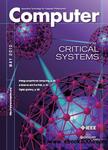版权所有:内蒙古大学图书馆 技术提供:维普资讯• 智图
内蒙古自治区呼和浩特市赛罕区大学西街235号 邮编: 010021

作者机构:George Washington Univ Dept Comp Sci & Elect Engn Washington DC 20052 USA
出 版 物:《COMPUTER》 (IEEE计算机杂志)
年 卷 期:1999年第32卷第7期
页 面:46-+页
核心收录:
学科分类:0808[工学-电气工程] 08[工学] 0835[工学-软件工程] 0812[工学-计算机科学与技术(可授工学、理学学位)]
主 题:Biscotti Eiffel-style invariants Eiffel-style postconditions Eiffel-style preconditions Java Java extension Java remote method invocation interfaces application program interfaces behavioral specification distributed applications distributed programming distributed software component interfaces distributed software component reuse formal specification networked computers object-oriented programming remote procedure calls software reusability
摘 要:Networked computers are finding their way into a broader range of environments, from corporate offices to schools, homes, and shirt pockets. This new computing model fosters the development of distributed software components that communicate with one another across the underlying networked infrastructure. A distributed software component can be plugged into distributed applications that may not have existed when it was created. The intention is that many developers will reuse distributed software components to build new systems. An interface definition language usually is used to describe a distributed software component s interface. However, a notable limitation of current IDLs is that they generally only describe the names and type signatures of the component s attributes and operations. Current IDLs don t formally specify the behavior of the software component s operations. To help solve these problems, the authors have developed Biscotti (behavioral specification of distributed software component interfaces), a Java extension that enhances Java remote method invocation interfaces with Eiffel-style preconditions, postconditions, and invariants.